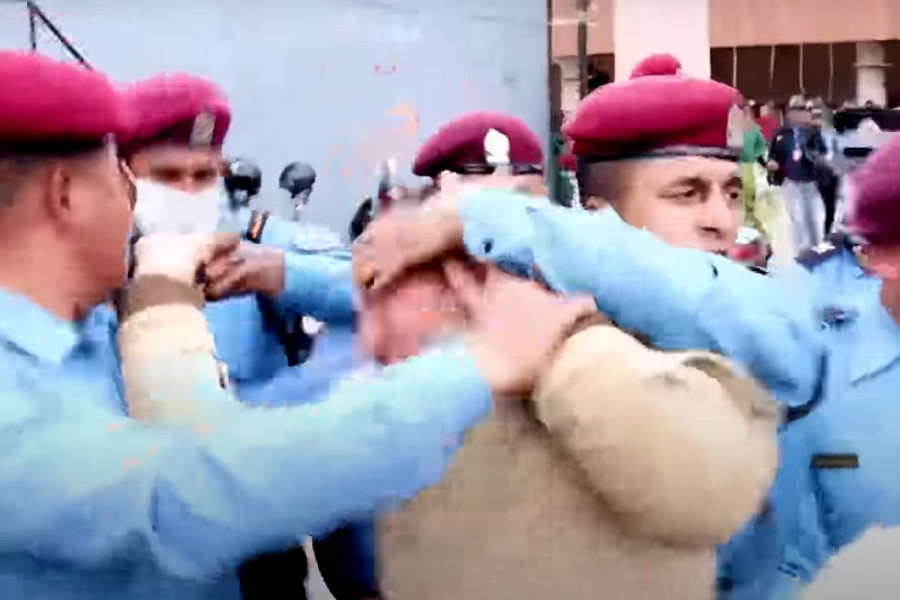Two recent incidents have made people question Dahal government’s sincerity to protect constitutional freedoms.

It was quite a sight. On Tuesday, police personnel were seen trying to tightly cover the mouths of some youths who were protesting against Prime Minister Pushpa Kamal Dahal—directly to his face. The young protestors seemed displeased with the high interest rates the banks and financial institutions have been charging of late.
In no time, the video of the police personnel trying to gag the protestors went viral, courting criticisms from all sections of society. The issue even reached the National Assembly.
Instead, the protestors have now been punished.
The District Administration Office Kathmandu has allowed the police to keep the three detained protestors in custody for five days for further investigation on charges of indecent behaviour. The detained are Uddav Basnet, 23, from Solukhumbu, Som Sharma, 30, from Baglung, and Biplav Khadka, 18, from Bajhang.
At the same time, the government is being denounced as it is planning to saddle the federal parliament with a controversial bill to amend telecommunication laws. Various circles—from public to intelligentsia—have been criticising the draft of the bill which will allow the government to tap the phones and social media details, without prior court approval, of just about anyone.
Madhu Raman Acharya, former foreign secretary, wrote on Twitter that the police or investigating officer should never record the personal phone calls under the pretext of investigation. Any such probe on a serious matter like national security, without seeking permission from court will go against personal freedom and privacy, he said.
Similarly, Nepali Congress senior leader Shekhar Koirala also criticised the government for trying to bring the provision to record personal call details. “Tapping phone calls under any pretext is unacceptable in democracy. A question has also been raised about the government’s intent as a similar attempt was stopped in the past following criticism,” Koirala tweeted. He has also asked political parties, human rights activists, civil society members, and media personnel to seriously think about the issue.
Till now, a court permit is a must to access someone’s phone calls or SMS records. The court had issued a mandamus order in 2016 barring the police and investigating authorities from accessing the phone and SMS records without a permission from the court.
If the draft bill gets endorsed, authorities seeking a prior court permission will be a thing of the past.
Section 77 (1) of the draft says the investigative body can record calls of anyone, or get the details disclosing the identity or other details from the service provider if the person in question is believed to be engaged in activities against Nepal’s sovereignty, territorial integrity, national interest, treason, crime or organised crime or criminal offence. Section 77 (2) says that there will be direct access to service providers for activities under sub-section 1.
Similarly, Section 79 states that investigating officers can also deactivate a telephone, mobile or communication media.
According to him, Section 77 (1) allows interception of all kinds of criminal offences, irrespective of their gravity, which is not justifiable on the grounds of ‘necessity’ and ‘proportionality’.
Similarly, the draft bill doesn’t distinguish between emergency and non-emergency situations. “Democracies around the world allow a certain level of executive power to be exercised in times of emergency,” he said. For example, in India, the investigating agencies do not need prior government approval for phone call interception during an emergency, but they need such permission during peace times.
The proposed draft also does not define the vague term “authorised investigation agency”. Similarly, it is unclear which personnel from such agencies will have access to private phone records. “The fundamental right to privacy guaranteed by the constitution cannot have such a low ceiling,” said Sigdel.
A broad provision under Article 77 (2) is even more problematic, according to Sigdel. “The provision of direct access to the entire system of service providers is aimed at widespread surveillance of citizens. Furthermore, the proposed provision says authorised agencies can use any ‘appropriate technology’ they deem necessary. The Pegasus software issue in India is an example of how the government could misuse its power in such cases.”
Opposition parties in India have been accusing the Modi government of spying on rival politicians. Pegasus infects mobile devices (both Android devices and iPhone), allowing it to extract messages, photos and emails, record calls and secretly activate microphones.
Tara Nath Dahal, executive chairman of the Freedom Forum that advocates free speech, said signs are that the Nepali state is not serious about protecting civil liberties. “We call this a democratic country and we have the right to freedom and privacy enshrined in our constitution too, but the state mechanisms including the political leadership are not committed to even basic freedoms such as the freedom of expression and right to privacy,” he said.
“Whenever the authorities are challenged, they show intolerance. They can’t take criticism. Our political system is democratic, but the mindset of our leadership is authoritarian,” said Dahal.












